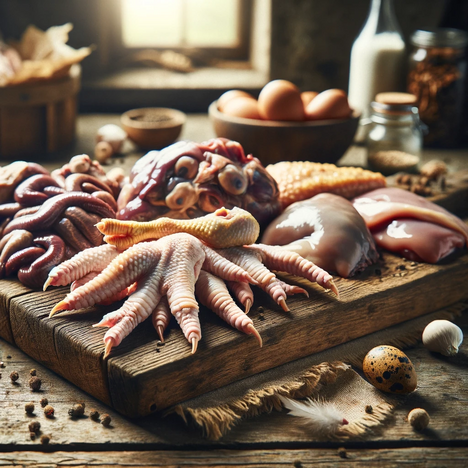Chicken by-products

When it comes to feeding our four-legged friends, quality and balance are paramount. In this context, we often come across terms such as "chicken by-products", which can raise questions at first glance. What exactly is behind this term and what role do these ingredients play in our dogs' diet? In this article, we take a deep dive into the topic of chicken by-products, highlighting their pros and cons and providing you with a comprehensive guide to help you make informed decisions about your dog's diet.
What are chicken by-products?
Chicken by-products are parts of the chicken that are not intended for human consumption but can provide valuable nutrients for dogs. These include, for example, hearts, livers, kidneys, lungs and stomachs. Contrary to what many assume, these are not "waste products" but high-quality sources of protein that also contain important vitamins and minerals.
The advantages of chicken by-products
High quality protein source
Chicken by-products are rich in high-quality protein, which is essential for the maintenance and repair of the body substance in dogs. Proteins from animal sources tend to have a higher biological value than plant proteins, which means they can be used more efficiently.
Rich in important nutrients
These by-products contain a wealth of vitamins and minerals that are important for a dog's balanced diet. These include vitamin A, vitamin B complex, iron and zinc. These nutrients play a key role in supporting a wide range of bodily functions, from vision to the immune system.
Natural diversity
The use of chicken by-products in dog food provides a diet that is closer to the natural eating variety and instincts of dogs. In the wild, dogs would not only eat the muscles of their prey, but also organs to obtain a wide range of nutrients.
The disadvantages of chicken by-products
Inconsistent quality
A common criticism is the quality and composition of chicken by-products. Because it is a broad category, the exact composition can vary, making it more difficult to accurately control nutrient intake.
Potential allergens
Some dogs can be sensitive to certain protein sources, and chicken by-products are no exception. For dogs with food allergies or intolerances, it may therefore be necessary to use hypoallergenic alternatives.
Processing concerns
The type of processing can also have an impact on nutritional value. Some processing methods can lead to the loss of important nutrients, which can affect the quality of the end product.
Finding a balance
Deciding whether chicken by-products should be part of your dog's diet depends on a number of factors, including your dog's individual needs, preferences and health conditions. While they are a rich source of nutrients and can contribute to natural dietary diversity, it's important to pay attention to the quality and origin of the food.
If you notice any signs of hypersensitivity or poisoning in your dog, you should see your vet immediately. We are not a substitute for a vet, but we try to be as accurate as possible. Every dog reacts differently and we recommend you get a second opinion or consult your vet if in doubt.
Stay healthy and take good care of your four-legged friend!😊